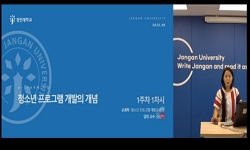To promote English language learning, universities in Taiwan have been setting up traditional and online English language self-study centers. English honors or elite programs are also being established to offer advanced training of the English languag...
http://chineseinput.net/에서 pinyin(병음)방식으로 중국어를 변환할 수 있습니다.
변환된 중국어를 복사하여 사용하시면 됩니다.
- 中文 을 입력하시려면 zhongwen을 입력하시고 space를누르시면됩니다.
- 北京 을 입력하시려면 beijing을 입력하시고 space를 누르시면 됩니다.
https://www.riss.kr/link?id=A106118666
-
저자
Yu-Chih Doris Shih (Fu Jen Catholic University) ; Yun-Pi Yuan (Fu Jen Catholic University)

- 발행기관
- 학술지명
- 권호사항
-
발행연도
2019
-
작성언어
English
- 주제어
-
등재정보
KCI등재,SCOPUS,ESCI
-
자료형태
학술저널
-
수록면
200-219(20쪽)
-
KCI 피인용횟수
0
- 제공처
-
0
상세조회 -
0
다운로드
부가정보
다국어 초록 (Multilingual Abstract)
To promote English language learning, universities in Taiwan have been setting up traditional and online English language self-study centers. English honors or elite programs are also being established to offer advanced training of the English language to students. A private university in northern Taiwan established the English Elite Program in 2008, providing courses in three different sections through traditional and distance learning modes. The distance learning courses aim to reduce students’ difficulties with conflicting schedules between the courses in their own departments and the program courses. In this study, the researchers evaluate the Elite Program using the Context, Input, Process, and Product (CIPP) model. Data were collected from program documents, questionnaires, classroom observations, graduates’ academic scores, and interviews of the instructors and graduates who received the program certificate. This study is helpful for program designers, teachers, students, and university administrators of this type of program and other similar foreign-language programs. This study also provides useful recommendations for universities planning to establish a similar program, particularly with the inclusion of distance learning courses.
참고문헌 (Reference)
1 Bakhtiar Naghdipour, "‘Close Your Book and Open Your Facebook’:" 아시아테플 14 (14): 130-143, 2017
2 Butler, Y. G., "What level of English proficiency do elementary school teachers need to attain to teach EFL? Case studies from Korea, Taiwan, and Japan" 38 (38): 245-278, 2004
3 Galvin, J. C., "What learners can learn from educators about evaluating management" 37 (37): 52-57, 1983
4 Nicholson, T., "Using the CIPP model to evaluate reading instruction" 32 (32): 312-318, 1989
5 Shih, Y-C. D., "Using EngSite for EFL teaching and learning: The evaluation and application of platform" Fu Jen Catholic University 2008
6 Tuncay, N., "Trend of"distance education"in the last three decades" 2 (2): 55-67, 2010
7 Berk, R., "Thinking about program evaluation" Sage 1999
8 Yang, F-Y., "The use of a writing center by non-native academic writers : A case study in Taiwan" 9 (9): 1-26, 2012
9 Su, T-Y., "The use of EngSite platform in distance language courses" 2008
10 Nunan, D., "The impact of English as a global language on educational policies and practices in the Asia-Pacific region" 37 (37): 589-613, 2003
1 Bakhtiar Naghdipour, "‘Close Your Book and Open Your Facebook’:" 아시아테플 14 (14): 130-143, 2017
2 Butler, Y. G., "What level of English proficiency do elementary school teachers need to attain to teach EFL? Case studies from Korea, Taiwan, and Japan" 38 (38): 245-278, 2004
3 Galvin, J. C., "What learners can learn from educators about evaluating management" 37 (37): 52-57, 1983
4 Nicholson, T., "Using the CIPP model to evaluate reading instruction" 32 (32): 312-318, 1989
5 Shih, Y-C. D., "Using EngSite for EFL teaching and learning: The evaluation and application of platform" Fu Jen Catholic University 2008
6 Tuncay, N., "Trend of"distance education"in the last three decades" 2 (2): 55-67, 2010
7 Berk, R., "Thinking about program evaluation" Sage 1999
8 Yang, F-Y., "The use of a writing center by non-native academic writers : A case study in Taiwan" 9 (9): 1-26, 2012
9 Su, T-Y., "The use of EngSite platform in distance language courses" 2008
10 Nunan, D., "The impact of English as a global language on educational policies and practices in the Asia-Pacific region" 37 (37): 589-613, 2003
11 Godwin-Jones, R., "The evolving roles of language teachers : Trained coders, local researchers, global citizens" 19 (19): 10-22, 2015
12 Lin, W. C., "The concept of designing EngSite learning platform" 2007
13 Malissa Maria Mahmud, "Technology and Language – What Works and What Does Not: A Meta-analysis of Blended Learning Research" 아시아테플 15 (15): 365-382, 2018
14 Tseng, C-T. H., "Teaching"cross-cultural communication"through content based instruction : Curriculum design and learning outcome from EFL learners’ perspectives" 10 (10): 22-34, 2017
15 Wu, W. S., "Selected papers from the Thirteenth International Symposium on English Teaching" English Teacher’s Association of the Republic of China 659-668, 2004
16 Nunan, D., "Research methods in language learning" Cambridge University Press 2001
17 Bogdan, R., "Qualitative research for education: An introduction to theories and methods" Allyn & Bacon 2007
18 Posavac, E. J., "Program evaluation: Methods and case studies" Prentice-Hall 1992
19 Kiely, R., "Program evaluation in language education" Palgrave Macmillan 2005
20 Chua, G-K., "Organising collaborative learning spaces for knowledge construction:Deep learning and online behaviour" Asia-Pacific Society for Computers in Education 285-290, 2008
21 Huang, H-C., "Online reading strategies at work : What teachers think and what students do" 25 (25): 340-358, 2013
22 Mayadas, A. F., "Online education today" 13 (13): 49-56, 2009
23 Yau, J. C., "New words and new worlds : Examination of literature-based instruction in university EFL classrooms" 4 (4): 1-25, 2007
24 Henderson, D. A., "Manageable evaluation" 31 (31): 1-16, 1998
25 Juang, Y-R., "Learning by blogging: Warm-up and review lessons to facilitate knowledge building in classrooms" Asia-Pacific Society for Computers in Education 279-284, 2008
26 Butler, Y. G., "Issues in the assessment and evaluation of English language education at the elementary school level : Implications for policies in South Korea, Taiwan, and Japan" 6 (6): 1-31, 2009
27 Liu, G-Z., "Integrating classroom and Internet-based English language instruction" 138 : 18-31, 2005
28 Bushnell, D. S., "Input, process, output : A model for evaluating training" 44 (44): 41-43, 1990
29 Matthews, J. M., "Guidelines for evaluating parent training programs" 50 (50): 77-86, 2001
30 Oshima, J., "Facilitation of intentional learning and formative assessments in large-scale university courses with ICT" Asia-Pacific Society for Computers in Education 275-278, 2008
31 Marsden, M. J., "Evaluation : Towards a definition and statement of purpose" 7 (7): 31-38, 1991
32 Wischnowski, M. W., "Evaluating co-teaching as a means for successful inclusion of students with disabilities in a rural district" 23 (23): 3-14, 2004
33 Jones, J., "Enhancing critical thinking in language learning through computer-mediated collaborative learning: A preliminary investigation" 2002
34 Chang, W-C., "English language education in Taiwan: A comprehensive survey" 2006
35 Brouwer, N., "Educational designing with MicroWorlds" 15 (15): 439-462, 2007
36 Huang, W-J., "Cultural instruction in a junior college EFL reading classroom" 8 (8): 77-101, 2011
37 Davin, K. J., "Converting data to knowledge : One district’s experience using large-scale proficiency assessment" 47 (47): 241-260, 2014
38 Davis, N. E., "Considerations on technology and teachers: The best of JRTE" International Society for Technology in Education 127-139, 2010
39 Batdı, V., "Comparing the high school English curriculum in Turkey through multi-analysis" 17 (17): 1255-1290, 2017
40 Chang, W-C., "Colloquia" 2008
41 Stufflebeam, D. L., "CIPP evaluation model checklist"
42 Chao, C-C., "CALL environments: Research, practice and critical issues" TESOL 1-13, 1999
43 Eseryel, D., "Approaches to evaluation of training : Theory & practice" 5 (5): 93-98, 2002
44 Tai, K. J., "Applying e-learning into college English courses" 2 : 43-52, 2006
45 Lin, Y-Y., "Analysis of course designs for applied English departments in southern Taiwan" National Kaohsiung Normal University 2003
46 Lu, C-C., "An approach to library evaluation from CIPP evaluation models" 3 (3): 1996
47 Yang, Y-Y., "A study on constructing the evaluation standard framework of the teacher education program" National Taipei University of Education 2003
48 Yao, F-Y., "A research on the current status analysis of technology-related courses in teacher preparation programs in Taiwan" National Taipei University of Education 2003
49 Wang, B-J., "A practicable model for teacher education program evaluation in Taiwan. A Study funded by NSC"
50 Kirkpatrick, D. L., "A T&D classic: How to start an objective evaluation of your training program" 58 (58): 16-18, 2004
동일학술지(권/호) 다른 논문
-
EFL Teachers’ L1 Backgrounds, Beliefs, and the Characteristics of Their Corrective Feedback
- 아시아테플
- Yoko Asari
- 2019
- KCI등재,SCOPUS,ESCI
-
A Corpus-Based Study on “Delexical Verb + Noun” Collocations Made by Korean Learners of English
- 아시아테플
- 최원경
- 2019
- KCI등재,SCOPUS,ESCI
-
- 아시아테플
- 김연희
- 2019
- KCI등재,SCOPUS,ESCI
-
- 아시아테플
- 이종봉
- 2019
- KCI등재,SCOPUS,ESCI
분석정보
인용정보 인용지수 설명보기
학술지 이력
| 연월일 | 이력구분 | 이력상세 | 등재구분 |
|---|---|---|---|
| 2023 | 평가예정 | 해외DB학술지평가 신청대상 (해외등재 학술지 평가) | |
| 2020-01-01 | 평가 | 등재학술지 유지 (해외등재 학술지 평가) |  |
| 2018-03-29 | 학회명변경 | 한글명 : 아시아영어교육학회 -> 아시아테플영문명 : The Asian Association Of Teachers Of English As A Foreign Language (Asia Tefl) -> AsiaTEFL (The Asian Association of Teachers of English As a Foreign Language) |  |
| 2013-10-01 | 평가 | 등재학술지 선정 (기타) |  |
| 2010-01-01 | 평가 | SCOPUS 등재 (신규평가) |  |
학술지 인용정보
| 기준연도 | WOS-KCI 통합IF(2년) | KCIF(2년) | KCIF(3년) |
|---|---|---|---|
| 2016 | 0 | 0 | 0 |
| KCIF(4년) | KCIF(5년) | 중심성지수(3년) | 즉시성지수 |
| 0 | 0 | 0 | 0 |





 KCI
KCI eArticle
eArticle






